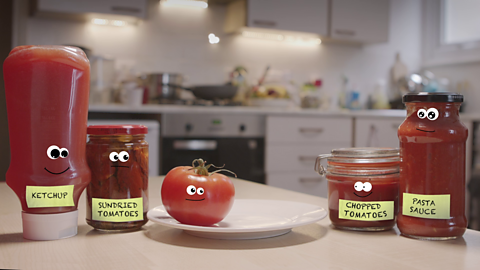Why do we need to drink water?
Water is essential to life and can be found in all living things. Find out why we need to include water in our diet.
In this article you can learn:
- why we need to drink water
- how much water we should drink
- what hydration and dehydration mean
- signs of dehydration
- where we can get water from
This resource is suitable for Health and Wellbeing for primary school learners.
Video - Why do we need water?
In this video, the Great Spoon explains why we need water in our diets and how much water is in different kinds of food.
THE GREAT SPOON In a world where all living things need hydration, one glass of water is on a quest to save all!
WATER Whatās hydration?
THE GREAT SPOON Adding water.
WATER Why didnāt you just say that, oh great and wise Spoon?
THE GREAT SPOON Hydration sounds more great, and wise.
PLANT Help me. Help me!
WATER Hang in there Plant, Iāllā¦ Whatās that word again?
THE GREAT SPOON Hydrate.
WATER Iāll hydrate you!
PLANT Well stop talking and hurry up then! Thank you Water, wanna hang out?
WATER Iād love toā¦ but I have people to hydrate.
THE GREAT SPOON Water is very busy ā it has many important jobs to do and takes many different forms. Itās hidden in lots of things we see and use today; It's in tea, it's in tomatoes, it's in apples, it's inā¦
WATERMELON Watermelon!
WATER Yes, thatās rightā¦
THE GREAT SPOON Itās even in people.
EVERYONE People?!
THE GREAT SPOON Human beings are made from approximately 60% water. Thatās nearly two thirds of every person.
WATER It's true!
THE GREAT SPOON Foods like cucumber, celery, lettuce, peppers and tomatoes contain around 95% water!
WATERMELON And watermelon.
WATER Yes, Watermelonā¦
EGG What about eggs? Is there water in eggs?
WATER Around 75% of an egg is water!
EGG Woo-hoo! Hang onā¦ I hear crying.
WATER Duty calls! What are you crying for? Get it? āWat-erā you crying for? Oh never mindā¦ I will save you!
PARENT Oooh thatās it sweetie. A nice drink of water. You were thirsty werenāt you, poppet!
WATER Panic over! I have eliminated the thirst. Anything to help you and your baby stay hydrated. Itās important to remember, you should always drink plenty of water, especially in hot weather. It helps keep your body working properly. Another wet day at the office! I love my job!

Key words about water
- Sorry, something went wrongCheck your connection, refresh the page and try again. ā The process of adding the required amount of water to your body.
- Sorry, something went wrongCheck your connection, refresh the page and try again. ā When the body does not have enough water to function fully.
- Sorry, something went wrongCheck your connection, refresh the page and try again. ā The amount of water in something. For example, how much water is present in a piece of food.
Why do we need water?
Our bodies are made up of more than 60% water. That is more than half of our body weight.
Our bodies are constantly losing water through:
- sweating
- going to the toilet
- breathing
To remain healthy and avoid dehydration it is important to replace this lost water throughout the day.
How much water should we drink?
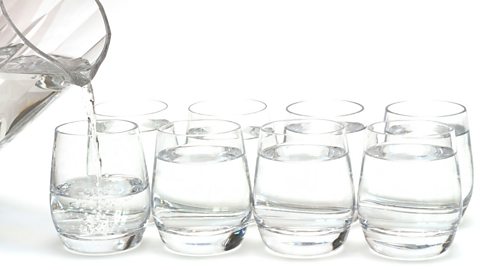
NHS guidelines advise drinking around six to eight glasses a day.
Our bodies lose more water than usual if we are very active or when the weather is particularly warm, because we sweat more. Before, during and after exercise we benefit from drinking water and eating foods with a high water content. This helps us to perform better and keeps replacing the water lost. Athletes need to stay hydrated to get the most out of their bodies.

Where can we get water from?
It is good for our health to eat foods that have a high water content, like fruit. For example, peaches, oranges and strawberries are all full of water, as well as nutrients.
Vegetables are also great at keeping us hydrated as they too have a high water content. Cauliflower and cabbage are good examples.
All drinks contain water (such as tea, milk and fruit juice) and help add to our daily intake. However, water is the healthiest option as it quenches our thirst and will not damage our teeth.
Signs of dehydration
If we do not drink enough water, our bodies become dehydrated.
- We can feel tired
- Our skin and lips become dry
- We might get a headache
- Our urine is darker in colour
- We go to the toilet less often
We generally start to feel unwell as we need water to carry out lots of important bodily functions.
Body functions and water
- Eyes ā water provides moisture to keep our eyes clear from irritation.
- Kidneys ā water helps our kidneys get rid of waste and toxins that our bodies do not need.
- Body temperature ā water allows our body to get rid of excess heat as sweat. This regulates our body temperature and stops us from getting too hot.
- Digestive system ā water plays an important role in our stomach, helping to digestTo break down food so that its nutrients and energy can be absorbed. food and transport nutrientsThe building blocks needed to keep a plant or animal alive and healthy. Animals get most of their nutrients from food. Plants get nutrients from soil and sunlight. around our body.
- Muscles and joints ā muscles are mostly water and water also cushions joints allowing them to move smoothly.
Find out more about our body systems with 2nd level Science on Bitesize.
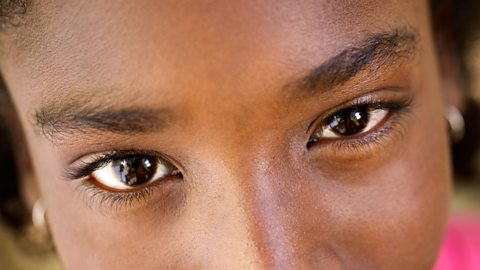
Image caption, Eyes
Water provides moisture to keep our eyes clear from irritation.
Image caption, Kidneys
Water helps our kidneys get rid of waste and toxins that our bodies do not need.
Image caption, Body temperature
Water allows our body to get rid of excess heat as sweat. This regulates our body temperature and stops us from getting too hot.
Image caption, Digestive system
Water helps us digest food and transport nutrients around our body.
Image caption, Muscles and joints
Muscles are mostly water and water also cushions joints allowing them to move smoothly.
1 of 5
Test your knowledge
Test your knowledge with this short true or false quiz.
Challenge - How much water do we need?
- Measure out 6ā8 glasses of water
- If you have a reusable water bottle, investigate how many times you would need to fill it and drink it a day to get the recommended amount of water. It depends on the volume of water your bottle holds.
- Make a list of your favourite foods and look up their water content. You can find the water content listed on food and drink labels or by researching foods, like fruit and vegetables, online.
More on Food and health
Find out more by working through a topic
- count4 of 10
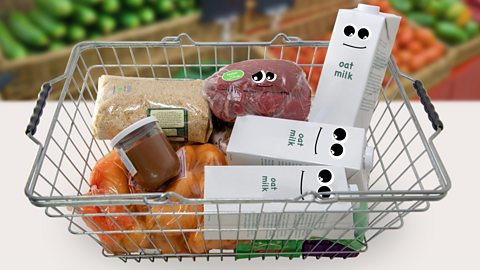
- count5 of 10
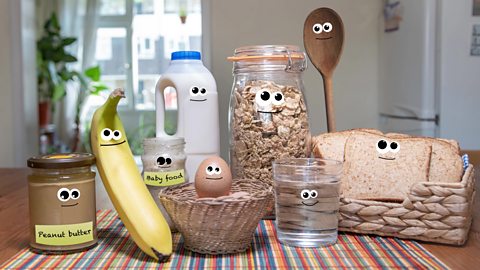
- count6 of 10
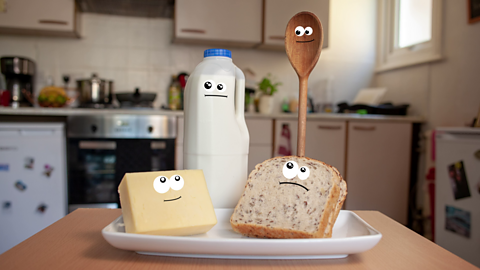
- count7 of 10
